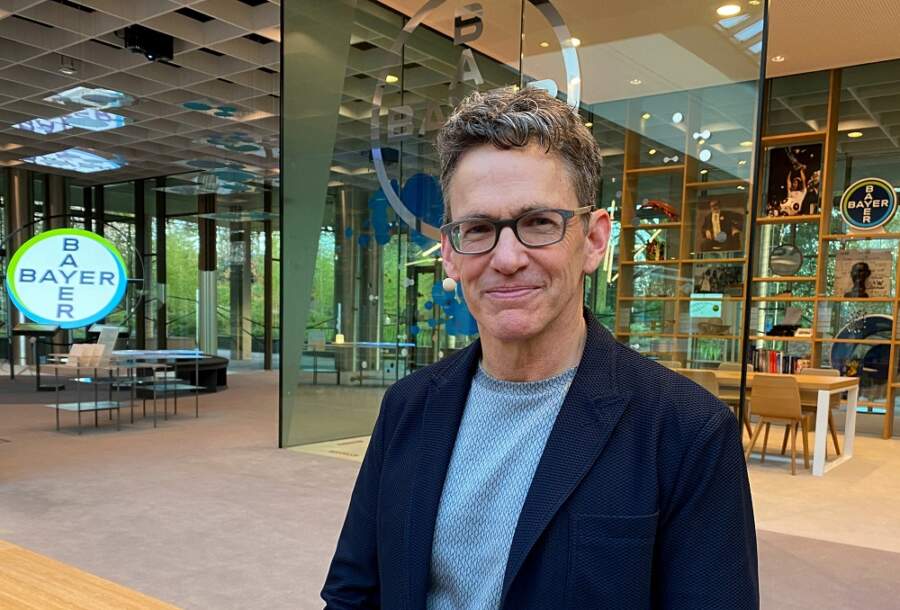
By Tom Käckenhoff, Patricia Weiss and Matthias Williams
LEVERKUSEN, Germany (Reuters) – Incoming Bayer chief executive Bill Anderson says he is keeping an open mind on whether to break up the company into smaller pieces, as some fidgety investors want.
Anderson, who takes over the nearly 160-year-old German drugmaker at the start of June after calls from investors to remove his predecessor, says he will spend the next two months “listening” and sees no consensus on the issue so far.
The 56-year-old chemicals engineer from the U.S., brought over from Swiss rival Roche, begins at a testing time, weighed down by lawsuits claiming Bayer’s weed-killer causes cancer and pressure from investors demanding major change.
Speaking to reporters at Bayer’s headquarters in Leverkusen on Tuesday, Anderson offered some clues as to his vision for the company, stressing a focus on results and advancing science, while keeping open the question of a break-up.
“I think it’s an overgeneralisation to say this is what everybody thinks should happen,” he said, saying that some investors wanted a split while others wanted better execution.
“That’s why I said I am going to have an open mind,” he said. “Because if I simply came in and said ‘no I think the answer is structure change’, I think that would really be short-changing the people and the legacy of this company.”
Bayer announced Anderson’s appointment in February, putting in charge only the second chief executive in its history who did not come from the company’s own ranks.
He replaces Werner Baumann, who promised “evolution not revolution” at the start of his tenure in 2016 but soon after launched the $63 billion takeover of seeds and pesticides maker Monsanto.
Lawsuits have dogged Bayer since it acquired the Roundup weed-killer brand as part of the Monsanto purchase. Anderson said he took the lawsuits “very seriously” but did not spell out a future course of action about them.
On the stock market Bayer, once the most valuable company on Germany’s DAX blue-chip index, is now worth only about the same as it paid for Monsanto.
“For me, it’s about: hey we got three amazing businesses, they are delivering really important products, medicines,” Anderson said.
“My focus is going to be around that, taking that all into account, how do we drive progress, what are the options?”
Investors expect Anderson to restore investor confidence and review the company’s structure after years of speculation about a break-up that could remove at least some of Bayer’s conglomerate discount.
“We see it as positive that Bill Anderson appears to want to focus first on accelerating progress with solving litigation and improving productivity in R&D, but is also leaving the door firmly open for larger-scale restructuring of the group in the future,” said Terence McManus, the Senior Portfolio Manager for Healthcare at Bellevue Asset Management.
McManus told Reuters he expected any restructuring to take time and also be contingent on the opinion of Bayer’s chairman.

OWNERSHIP BUT NO DESK
With decades of experience in the pharmaceutical industry, father-of-three Anderson often appears in T-shirts and casual wear, and met reporters on Tuesday wearing a black jacket and jeans. At Bayer, he said he did not have his own desk and made use of the company’s meeting rooms as needed.
Professing a love of American football, hiking and snowboarding, he was also effusive about Bayer as a company and its heritage of medicines such as Aspirin.
Anderson has moved home 13 times. Leverkusen reminds him of Jackson, Texas, where he grew up in the shadow of a large Dow Chemical plant where his father worked, he said.
At the start of his tenure, he also faces another challenge.
“Ich muss Deutsch lernen,” he said: “I have to learn German.”
(Reporting by Tom Käckenhoff, Patricia Weiss, Matthias Williams, Miranda Murray, Ludwig Burger; writing by Matthias Williams; editing by Alexandra Hudson)


